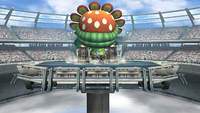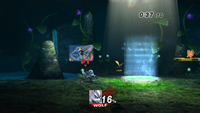Boss Battles
Boss Battles Mode (also called Boss Battles, Boss Mode, Bosses Mode, Boss Rush, or Boss Rush Mode) is an unlockable Stadium mode introduced in Super Smash Bros. Brawl that is very similar to All-Star Mode, except the player fights all the bosses rather than all the playable characters. Boss Battles Mode is unlocked after the player completes both Classic Mode & The Subspace Emissary for the first time, or in other words, has defeated each boss at least once (aside from Crazy Hand). Hi ,e is a dummy
Gameplay

The goal of Boss Battles Mode is to defeat every boss in the game with a single stock. When a player begins Boss Battles Mode, they are immediately dropped into combat against one of nine bosses (excluding Tabuu). Once a boss is defeated, the player is brought to the rest area. The rest area displays all defeated bosses as trophies, a screen that displays the face of next boss to be fought, and has limited recovery items. There are three Heart Containers, which recover the player's damage to 0% and don't reappear upon later visits to the rest area. This format continues until all bosses are defeated.
The bosses are fought in random order, except for Tabuu, who is always last. Bosses are now weaker and much slower to compensate the fact that player has only one life and no continues; however, some attacks can still OHKO, normally on the higher difficulties. The reduction of speed and knockback is more evident on the lower difficulties (Easy overall) than on the highest ones (Intense in particular).
This format is mostly the same as All-Star Mode. However, continues are unavailable, so the mode must be retried from the beginning if a Game Over is earned. The final three bosses before Tabuu move and attack at a faster rate (most noticeable with Rayquaza & Galleom), and boss HP gradually increases as the mode progresses. The player is treated to a picture of one of the bosses upon completing the mode; this picture varies depending on the difficulty level chosen, starting from Petey Piranha for Easy to Winged Tabuu for Intense.
Boss Battles also includes a co-op mode, where both characters will have a single stock and there will be three extra Heart Containers for a total of six. Both players must remain alive; if either player loses their stock, the game ends.
The battles in this mode include:
Rewards
There are eight trophies obtained by completing Challenges and one unlockable character in Super Smash Bros. Brawl involving boss battles mode. None of these challenges can be broken by a Golden Hammer, except in PAL versions of the game (which can break open all challenges). These trophies cannot be unlocked in co-op play. If done in co-op mode, the high scores (similar to All-Star) are tracked into a unique reserved slot rather than being any attached to any character.
- Clearing Boss Battles with Fox or Falco will challenge the player to beat Wolf, and beating him will unlock him.
- Clearing Boss Battles with 10 characters unlocks the Subspace Gunship trophy
- Clearing Boss Battles with 20 characters unlocks the Jyk trophy
- Clearing Boss Battles with every character unlocks the Winged Tabuu trophy
- Clearing Boss Battles on Easy difficulty unlocks the Subspace Bomb trophy
- Clearing Boss Battles on Normal difficulty unlocks the Shadow Bugs trophy
- Clearing Boss Battles on Hard difficulty unlocks the Dark Cannon trophy
- Clearing Boss Battles on Very Hard difficulty unlocks the Porky Statue trophy
- Clearing Boss Battles on Intense difficulty unlocks the Galleom (Tank Form) trophy
Changes from other modes
- Several of the bosses are slightly altered from their appearances in other modes.
- Bosses generally have around half the HP they do in the equivalent difficulty in the Subspace Emissary and Classic Mode, with their attacks having slightly more than half the power as well (usually having the same knockback of the previous difficulty in the Subspace Emissary or Classic Mode). This may be to compensate for stickers being unavailable.
- Bosses are additionally slower than normal, unless they're one of the final three before Tabuu.
- The maximum health can vary vastly depending on the difficulty. For example, Tabuu's HP are around 1/3 of their equivalent difficulty on Easy in the Subspace Emissary, but nearly 60% on Intense. However, in co-op mode bosses' health is still increased by 66% as in the Subspace Emissary.
- Crazy Hand is a boss on his own, rather than together with Master Hand.
- Master Hand and Crazy Hand have Stamina Bars like other bosses, rather than the usual HP shown at the bottom. Both Hands also suffer a much more severe HP drop than the other bosses, resulting in them having much less HP than the other bosses despite having above average HP in Classic Mode. Their attacks are also much weaker, even on Intense difficulty, compared to the equivalent Classic Mode fight.
- Galleom will be fought randomly in one of his two stages. His death animation will depend on when the player fights him. If they fight him as one of the earlier bosses, he will kneel to the ground, defeated (like his animation at the end of The Wilds I). If he is fought as one of the last three bosses before Tabuu, he will fall backwards to the ground (like his animation at the end of The Ruined Hall or when finished by a strong attack like Falcon Punch).
- Additionally, while the attacks of bosses are normally slower in Boss Battles, Galleom's Uppercut attack is always faster in Boss Battles than it is on the equivalent difficulty in the SSE. However, it is also its most nerfed attack and can no longer OHKO.
- There is no time limit when fighting Meta Ridley.
- On lower difficulties only, most attacks lose their guaranteed OHKO power and their damage is severely reduced (for example, Tabuu's Off Waves on Easy deal 22%-36% instead of 70%-78% and are not an invariable OHKO).
- Meta Ridley's Falcon Flyer Slam, Pull and Smash are not weakened, and will still drag the player past the blast lines for a guaranteed KO regardless of difficulty. However, they are slower than in the Subspace Emissary.
- Unlike in the Subspace Emissary, Tabuu's Off Waves are not nerfed in co-op mode.
- Petey Piranha's cages are empty, as they are when he is faced in The Great Maze. Similarly, the sky is clear rather than covered in dark clouds.
- The individual boss themes are replaced with an arrangement of Melee's menu music, called Boss Battle, except for those of of Master Hand, Crazy Hand, and Tabuu. They use the music Final Destination (Melee), Giga Bowser (Melee), and Boss Battle Song 2, respectively.
- Items don't appear and stickers can't be used.
- The player's gravity and falling speed are the same of normal Brawls, while in the Subspace Emissary they are increased up to 19%. This makes KOs slightly more likely, although the difference is usually subtle.
- The camera behaves as it does in normal Brawls rather than how it behaves in the Subspace Emissary.
Gallery
Below are the congratulations screens for completing Boss Battles Mode.
Trivia
- The player can move while the Announcer is still saying "Ready?" and before he says "GO!".
- Water effects from F.L.U.D.D. and Water Gun and Push effects from PSI Magnet will make the color in the boss's health bar blink as it does when the boss takes damage, even though these moves inflict none.
- The Boss Battles Mode is similar to The Arena from the Kirby series.
- In Super Smash Bros. Ultimate, the true ending of World of Light features a boss rush that pits the player against all the bosses (except for Master Hand and Crazy Hand), which can be fought in any order, before the true final boss.
- Sephiroth's route has him fighting against all the bosses in the game (aside from Galeem and Dharkon) in a Boss Rush.
| Super Smash Bros. Brawl menu items | |
|---|---|
| Group | Brawl (Time · Stock · Coin Battle · Team Battle) · Rules · Special Brawl · Rotation · Tourney · Names |
| Solo | Classic · All-Star · Adventure Mode: The Subspace Emissary · Events · Stadium (Target Smash!! · Home-Run Contest · Multi-Man Brawl · Boss Battles) · Training |
| Wi-Fi | Spectator Mode · With Anyone · With Friends |
| Vault | Trophies & Stickers (Trophy Gallery · Trophy Hoard · Coin Launcher · Sticker Album · Sticker Center) · Stage Builder · Album · Challenges · Replays · Masterpieces · Chronicle |
| Options | Screen · Deflicker · Rumble · Controls · Sound · My Music · Erase Data |
| Data | Movies · Records (Group Records · Brawl Records · Notices) · Sound Test |





